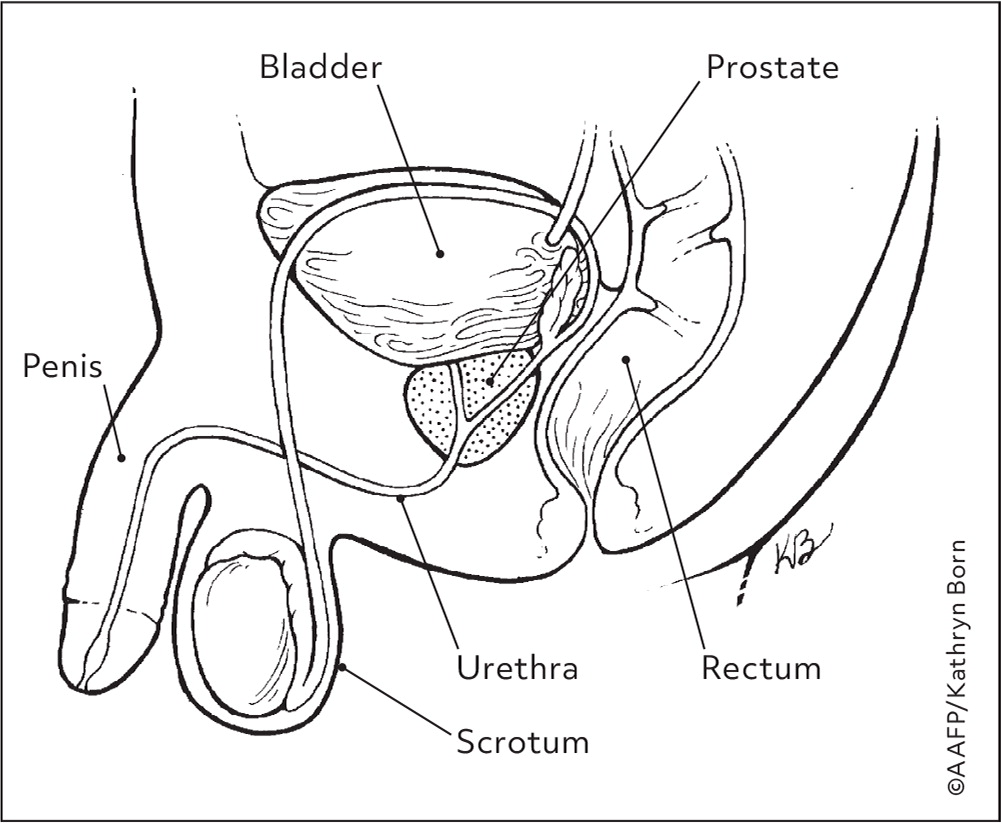
Am Fam Physician. 2024;110(5):online
Related article: Prostate Cancer Screening: Common Questions and Answers
WHAT IS THE PROSTATE?
The prostate is a walnut-sized organ that sits behind your penis. Its purpose is to help make semen. It usually gets larger with age.

WHAT IS PROSTATE CANCER, AND HOW COMMON IS IT?
Sometimes as the prostate gets larger with age, cancer cells form inside of it. This mostly happens in older men. In fact, about 1 out of 8 men will get prostate cancer. Usually, the cancer is small, grows slowly, does not spread, and never causes a problem.
But, sometimes it can become a problem.
WHEN IS PROSTATE CANCER A PROBLEM?
Most of the time, prostate cancer has no symptoms and men don't even know they have it. However, once in a while it can grow and spread, and even cause death.
Urine flows through the prostate. As it gets larger, you might have trouble peeing. You also might wake up more often at night to pee or notice your urine coming out more slowly.
It's hard to tell what's causing urinary problems. It might be the prostate normally getting larger with age. Or, it could be caused by cancer.
Sometimes, prostate cancer can happen with no urinary symptoms at all.
So, the only way to know if you have prostate cancer is screening.
HOW DOES SCREENING WORK?
Screening uses a blood test called PSA (prostate-specific antigen). If the PSA blood test result is high, you may have prostate cancer. But, a high PSA level can also be caused by other things, like infection, recently having sex, exercise, or from a big prostate. So, if the PSA level is high, more testing is needed.
WHAT WILL HAPPEN IF MY PSA TEST RESULT IS HIGH?
The first step is to get another PSA test to make sure the first test result was correct.
If the test result is still high, your doctor might recommend other options to check for cancer. They include:
Doing other blood or urine tests.
Taking pictures of the prostate with an MRI (a magnetic resonance imaging test).
Taking a biopsy. This involves using a needle to remove a small piece of the prostate tissue to check under a microscope to look for cancer cells. A biopsy is done by a urologist (a doctor who focuses on the urinary tract and the prostate).
If your PSA level is only a little bit higher than normal, you should have more PSA tests over time to see if it keeps going up. This can be a good option if you are not at high risk for prostate cancer. However, you are at higher risk if:
Your father or brother had prostate cancer.
More than one person in your family had it.
You are Black.
WHAT IS THE BENEFIT OF SCREENING?
Most prostate cancers grow slowly and don't cause problems, but sometimes they do. The benefit of screening is finding those bad cancers early. That way you can get treatment and keep the cancer from spreading.
WHAT ARE THE RISKS OF SCREENING?
If you get screened and your PSA level is high, you will likely have more tests, including a biopsy that can cause pain, infection, or bleeding.
If the biopsy shows cancer, you might get treatments like surgery or radiation. Although they can stop cancer from spreading and killing you, they can also cause their own problems, like trouble with erections or not being able to hold in your urine.
Since most prostate cancers grow very slowly and will never be a problem, treatments aren't always needed. When doctors are not sure how the cancer will behave, they keep a close eye on it with periodic exams, PSA testing, and other tests like MRI or biopsy to make sure the patient is treated before the cancer can spread.
SO, SHOULD I GET SCREENED FOR PROSTATE CANCER?
It's not an easy decision, because screening can be helpful or harmful.
You need to discuss it with your doctor.
Currently:
Men 55 to 69 years of age should discuss screening with their doctor.
Men at higher risk should discuss screening starting when they're 45 to 55 years of age.
Screening is not recommended for men who are 70 years or older. That's because older men are more likely to have complications from biopsies or treatment. And, they often have other medical conditions that will cause problems before the prostate cancer does.
WHERE CAN I LEARN MORE?
Other useful websites about prostate cancer screening:
An online tool that can help men decide if they should get prostate cancer screening:
